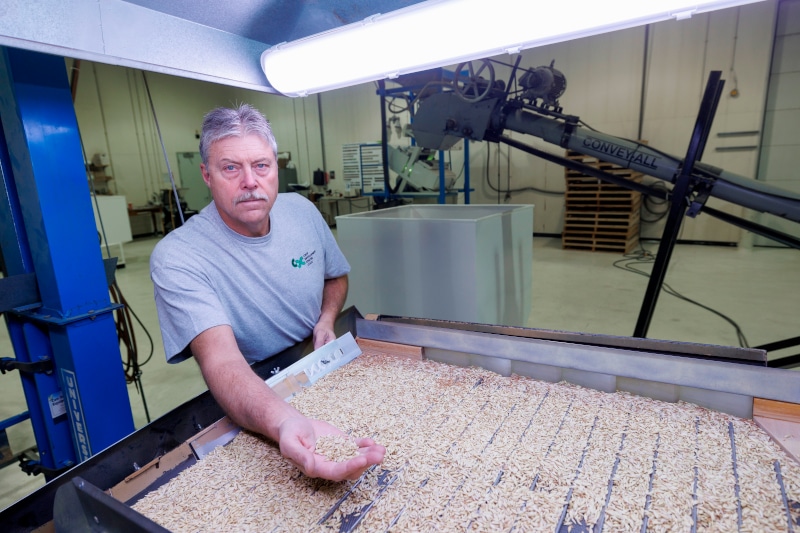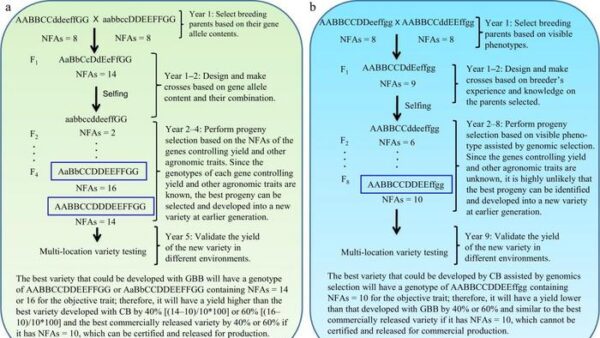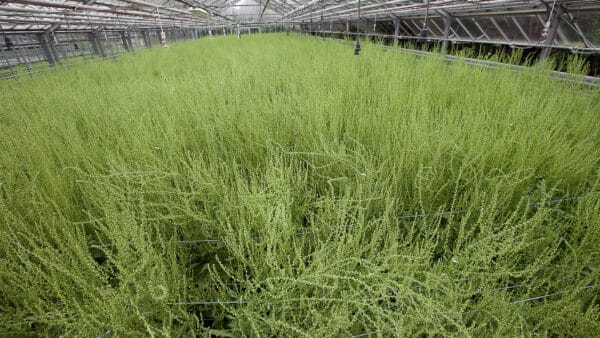The Canadian Seed Growers’ Association is making its case for why it should lead our seed certification system into the future.
Craig Riddell is a busy person with a lot on his plate. The owner of Manitoba’s Riddell Seed Co. deals with a lot of paperwork, and the prospect of a digital end-to-end seed certification system is something that gets him excited.
“Unlike larger seed farms with vast acreages dedicated to a few crops, our operation revolves around managing numerous small lots. Managing around a hundred lots annually, the manual labour involved in copying, pasting, and handling paperwork becomes quite a headache,” he says.
The issue isn’t just the volume of necessary data points; it’s also the lack of cohesion between platforms. Each step, from seed analysis to grading documents, feels disjointed, with no seamless flow of information. According to Riddell, the tedious process of transcribing numbers and data means the possibility of unnecessary data entry errors.
Enter a modernized seed regulatory system envisioned by the Canadian Seed Growers’ Association (CSGA), which recently released its positions on the questions posed by the Canadian Food Inspection Agency (CFIA) in its winter SRM survey, which is open for responses until May 1. Among the numerous questions posed to seed sector stakeholders in the survey, one stands out that illustrates CSGA’s overarching vision for SRM: whether stakeholders support CSGA providing more seed certification services to the sector.
The survey is an important milestone in a once-in-a-generation modernization of our seed systems. It will impact your seed and your business, according to CSGA Executive Director Doug Miller.
“Let’s face it — our system, while it’s a strong one that has served Canada well for a long time, is disjointed. There’s this awkward split right down the middle of the seed certification process, with one hand often unaware of what the other hand is doing. CSGA’s goal is simple: to act as the main administrator of our seed certification system and consolidate certification services into a single digital window, leading to a more streamlined and responsive regulatory framework,” Miller says.
“CSGA has been doing this for 120 years now. We’ve got our part of the system down pat and highly optimized. But you know what’s puzzling? In the SRM process, finding someone to step up and take on such a big project is a challenge. We’re all aware of the problems plaguing our sector, but finding someone to step up and take a leading role on the seed certification piece isn’t easy. What we’re proposing is a game-changer for Canada’s seed industry, and it only makes sense for CSGA to spearhead it.”
CSGA has demonstrated its effectiveness as a modern co-regulator within Canada’s seed certification system. Positioned to assume additional administrative responsibilities from the CFIA, CSGA would aim to foster an industry-led, government-supported certification framework that is adaptable, contemporary, and tailored to the evolving requirements of Canadian agriculture.
“The vision we’re putting forward is our solution to that challenge. It’s a once-in-a-generation opportunity for the seed sector to come together and align on significant initiatives like a digital single window and having a single non-government entity responsible for seed certification,” Miller says. “These are impactful, ambitious goals that the seed sector has been lacking and which CSGA is excited to bring forward for consideration.”

Fully Digitizing Seed Certification Can Be A Reality
Those goals include expanding CSGA’s SeedCert platform to collect information related to pedigreed seed declarations, seed grading reports, and quantity of seed certified, thus creating a digital end-to-end seed certification information management system.
For Dave Benallack, breeder seed manager for the Crop Development Centre (CDC) Breeder Seed Facility at the University of Saskatchewan, the time to completely digitize Canada’s seedscape with such a digital end-to-end system has come.
The CDC has eight plant breeders who work their magic in creating new varieties. When they identify a variety with potential for the industry, they pass it on to Benallack’s team to multiply and maintain the breeder seed.
Benallack has been involved in this process for years and has spent countless hours dealing with paperwork and applications for breeder seed plots. He’s more than familiar with the administrative and practical aspects of field production.
He already has experience testing out CSGA’s digital seed tags, which he says have made a huge difference in his workflow. Now, it’s time to take the next step with CSGA’s idea for a digital end-to-end single window for all seed certification services, which would expedite data access, provide value-added traceability opportunities for the seed sector and its customers, and improve monitoring and regulatory oversight of the sector.
“Accessibility is crucial because not all users are constantly in the office — they may need information while out in the field, for instance. With modern technology, accessing this information remotely is possible, even in remote locations,” he says. “This digital end-to-end system would ensure that growers have access to comprehensive seed information whenever and wherever they need it.”
Miller estimates CSGA is about 85 percent of the way there in terms of delivering this end-to-end system. Sure, there’s still some heavy lifting involved, but he notes that CSGA has a solid foundation to build upon.
“In the past, certification decisions used to take 3-4 weeks, but now, with SeedCert, they’re made in hours. That’s a huge leap forward. We’re moving towards a more proactive approach, aiming for real-time oversight based on activity rather than just time,” Miller says.
Riddell agrees that the goal of digitization should be to make information readily available and easily understandable to those who need it. By consolidating data and simplifying its presentation as CSGA proposes, our sector can improve efficiency, enhance user experience, and ultimately, drive better outcomes for our business and customers, Riddell says.
“It would be incredibly convenient if this platform could serve as a central repository for all our data needs. I believe a significant portion of the seed industry would welcome such a centralized database. Ultimately, our goal is to enhance process integration, making our operations more efficient and error-free.”
Under CSGA’s Vision, Transparency is Key
For Michelle Wall, seeds regulatory lead for Syngenta Canada, centralizing the country’s seed databases would be hugely helpful, especially for hybrid corn. As she explains, multiple databases currently exist to handle seed varieties, including the Seeds Canada Corn Hybrid Database and the CFIA database of registered varieties in Canada.

Of course, there’s also CSGA’s Form 300 process that Wall deals with all the time, which allows crops like hybrid corn that are not subject to variety registration to be eligible for seed certification.
In its winter survey, the CFIA is asking respondents if they support the CFIA taking over the Form 300 process from CSGA. While CSGA proposed and supports the idea, it is open to providing administrative services to the CFIA to ensure current Form 300 service standards are maintained or — even better — improved.
It’s evident that the industry favours the current Form 300 process, Miller notes, and he completely understands why — it’s efficient, timely, and cost-effective. But here’s the thing: CSGA doesn’t believe it has the authority to recognize seed varieties not subject to variety registration and thinks this is an appropriate function for government. That’s why CSGA wants to see a solution where the Form 300 process becomes a variety listing framework administered by CFIA that exists outside of the CFIA’s variety registration system.
A stand-alone variety listing framework means these crop kinds would not re-enter variety registration. Instead, it would provide a lightweight framework for the CFIA to recognize the eligibility of varieties for seed certification. This simplifies matters: no need for merit or recommending committees — just a straightforward application process for eligibility and a variety listing framework.
“There are certain topics that are typically avoided at the dinner table — politics, religion, and variety registration,” Miller adds. “That said, we really need to talk about variety registration in the context of seed and seed certification. It’s a significant aspect of our seed and certification framework, and a key value-added framework for Canada both domestically and internationally.”
For Wall, if the CFIA were to take charge of Form 300, our sector could further streamline information, making it more accessible to growers, producers, and seed buyers, essentially creating a one-stop shop for essential seed information. The CFIA could then oversee both variety registration and what Syngenta terms the “variety listing” for Form 300 crops.
“Syngenta sees value in having that CFIA oversight as it promotes transparency, benefiting not just Syngenta but the entire hybrid corn industry and beyond,” she says.
“In practice, the processing timelines for Form 300 as it stands right now are much faster than the eight to 12-week standard typically seen for crops subject to variety registration. If the CFIA were to take over the process, we hope the processing timelines for Form 300 would remain consistent with what they are currently, ensuring efficiency and timely certification.”
For Miller and CSGA, it’s a perfect fit.
“Our stance is clear: there should be a single entity responsible for recognizing varieties, and that entity should be the CFIA,” Miller says.
Have Your Say

The CFIA’s winter survey covers four main areas: variety registration; sampling, testing and grading of seed; import, export and sale of seed; and big-picture concepts. CSGA encourages all CSGA members, clients, and supporters to respond to the CFIA consultation survey.
Riddell served on the final SRM Task Team (the Information team) and encourages all seed sector stakeholders to fill out CFIA’s winter survey and, when doing so, consider the merits of the wide-ranging vision proposed by CSGA in its Complete Q&A Document.
“Instead of being bound by inflexible federal legislation that undergoes infrequent updates, we could adopt a more dynamic approach. This could involve retaining essential regulatory components while allowing for more frequent adjustments to accommodate shifts in the marketplace,” Riddell says.
“By granting greater flexibility and autonomy to a national body like CSGA, we can ensure that seed regulations remain relevant and effective in the face of ongoing industry changes.”
Benallack agrees.
“I think it would be advantageous for CFIA to transfer some responsibilities over to CSGA. When dealing with fewer organizations, everything becomes much simpler.”
Miller took part in an April 9 webinar tackling the topic of SRM along with Seed World Canada Editor Marc Zienkiewicz. Inspired by the Hot Ones YouTube series, the pair snacked on increasingly spicy hot wings and tackled increasingly spicy SRM-related questions. Watch below!











